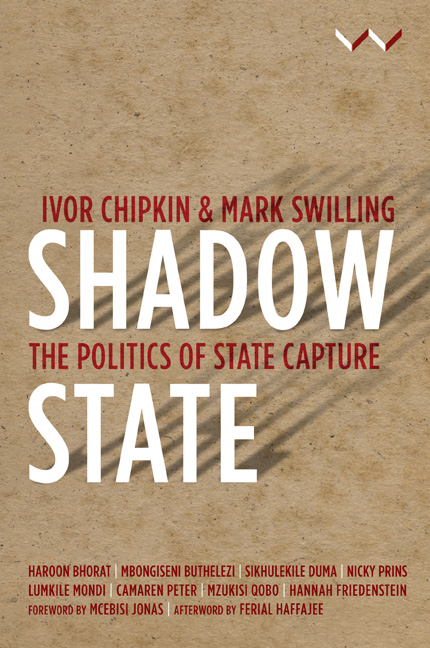Book contents
- Frontmatter
- Contents
- List of figures and tables
- Acronyms and abbreviations
- Key terms
- Acknowledgements
- Foreword
- Prologue
- Introduction
- Chapter 1 Structuring the Capture of the State
- Chapter 2 The Politics of Betrayal
- Chapter 3 Power, Authority and Audacity: How the Shadow State Was Built
- Chapter 4 Repurposing Governance
- Chapter 5 Conclusion
- Afterword
- Contributors
- Index
Chapter 5 - Conclusion
Published online by Cambridge University Press: 17 May 2019
- Frontmatter
- Contents
- List of figures and tables
- Acronyms and abbreviations
- Key terms
- Acknowledgements
- Foreword
- Prologue
- Introduction
- Chapter 1 Structuring the Capture of the State
- Chapter 2 The Politics of Betrayal
- Chapter 3 Power, Authority and Audacity: How the Shadow State Was Built
- Chapter 4 Repurposing Governance
- Chapter 5 Conclusion
- Afterword
- Contributors
- Index
Summary
State capture by shadowy elites has profound implications for state institutions. It destroys public trust in the state and its organs, it weakens key economic agencies that are tasked with delivering development outcomes, and it erodes confidence in the economy.
When there is no trust in public institutions there is little incentive to pay tax; large companies sit on cash rather than reinvest profits towards productive use; criminality proliferates, exploiting weaknesses in intelligence and crime enforcement authorities; and both capital and skills flee the country. The majority of South Africans are bearing the brunt of these corrosive developments.
In the previous chapters we have documented the systematic repurposing of state institutions by the Zuma-centred power elite. These premeditated and coordinated activities are designed to enrich a core group of beneficiaries, to consolidate political power and to ensure the long-term survival of the rent-seeking system that has been built by this power elite over the past decade. To this end a symbiotic relationship between the constitutional state and the shadow state has been built and consolidated.
At the nexus of this symbiosis is a handful of companies and individuals connected in one way or another to the Gupta–Zuma family network. Decisions made within this nexus are executed by well-placed individuals located in the most significant centres of state power (in government, SOEs and the bureaucracy).
Former Deputy Minister of Finance Mcebisi Jonas told the public protector that he had been offered a place in this network with a R600 million bribe. This transaction reveals the clear modus operandi of those who operate within the shadow state, and how this has made it possible for them to gain control of the constitutional state.
Crucially, we have no idea how many others accepted these kinds of unimaginably enormous bribes. Those who resist are systematically removed, redeployed to other lucrative positions to silence them, placed under tremendous pressure, or hounded out by trumped up internal and/or external charges and dubious intelligence reports.
We have argued that the attempts by the Zuma-centred power elite to centralise the control of rents in order to eliminate lower-order rent-seeking competitors began in about 2012.
- Type
- Chapter
- Information
- Shadow StateThe Politics of State Capture, pp. 133 - 138Publisher: Wits University PressPrint publication year: 2018

